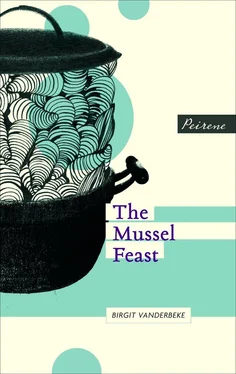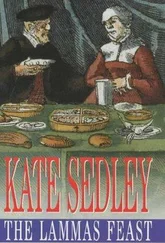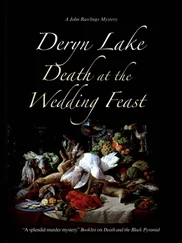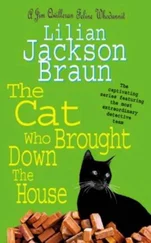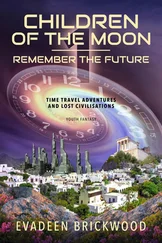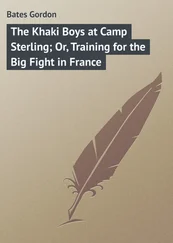Birgit Vanderbeke
The Mussel Feast
It was neither a sign nor a coincidence that we were going to have mussels that evening. Yes, it was slightly unusual, and afterwards we sometimes spoke of the mussels as a sign, but they definitely weren’t; we also said they were a bad omen — that’s nonsense too. Nor were the mussels a coincidence. This evening of all evenings, we’d say, we decided to eat mussels. But it really wasn’t like that; you couldn’t call it a coincidence. After the event, of course, we tried to interpret our decision as a sign or coincidence, because what came in the wake of our abortive feast was so monumental that none of us have got over it yet. We would always have mussels to celebrate a special occasion, and this was a special occasion, although in a very different way from what we’d had in mind. Basically, what we’d had in mind when we were planning the mussel feast was pretty insignificant, certainly less important than the immensity and gravity of what actually happened. But you can’t call our decision to cook mussels that evening a sign or coincidence.
Mussels were my father’s favourite food, although not ours; my brother liked mussels too, whereas my mother and I never cared for them much. I don’t care for them much, my mother always said as she bent over the bathtub, alternating between the small kitchen knife and the scrubbing brush, her hands bright red from cleaning mussels under the cold tap; she had to scrape, scrub, brush and rinse several times because my father hated nothing more than grains of sand crunching between his teeth. The sound drove him round the bend. I really don’t care for them much, my mother said that afternoon too, blowing on her icy hands. But it was a special occasion and that’s why she’d gone and bought four kilos. She thought my father would enjoy a feast of mussels when he returned home from his business trip, because he’d usually had enough of the fried and grilled lumps of meat he was served up on his trips, and so he would ask Mum to make him some decent food, something home-made at any rate; he never got anything like that in the conference hotels. He was fed up with these conference hotels; they may be comfortable, but they’re not cosy, he said. My father hated going away on business trips; he preferred to stay at home with the family, so his return was always a special occasion. It was our custom to have jacket potatoes with quark and linseed oil, sometimes pea soup, too, and because my father had eaten this food as a child, he’d often request it for nostalgic reasons. He never actually asked for mussels since my parents always cooked mussels together. So for Mum to be scrubbing the mussels on her own that day, her hands bright red under the cold tap, was unusual in itself; it was quite normal, however, for her to say, I don’t care for them much. It was what she always said when my parents scrubbed mussels in the bathroom together, taking it in turn to bend over the tub so that neither became too stiff. For a good hour the bathroom would resound with my father’s laughter and my mother’s squealing and in the past you might have heard them singing the old workers’ song ‘Come, Brothers, to the sun, to freedom’, which they’d learned over there and were forced to sing; ‘This is the final struggle’ and songs like that, my mother with her soprano voice and my father in his baritone. But later, when we were in the company accommodation, they didn’t sing any more. When they came out of the bathroom with bright-red hands they’d look a bit sheepish after all their larking around, and they’d continue messing about in the kitchen. Over time we found out that when they’d gone on their delayed honeymoon to my uncle’s, he’d cooked them a dinner of mussels. They’d never tasted mussels before, because of course there weren’t any mussels in the East, so they must have seemed rather exotic. They also thought there was something suggestive about mussels, something naughty, and they always started flirting when we were having mussels; as a result of the delayed honeymoon by the sea, flirting was routine at our house when mussels were on the menu. And remained so until that day, which we knew in advance was a special, even historic day for our family, for this business trip was to be the last step on my father’s path to promotion. None of us doubted that my father would gain his promotion; for weeks we stayed as quiet as church mice on Saturdays and Sundays while he was writing his lecture and also drawing several colour transparencies by hand; we always said how beautiful these transparencies looked; so, what do you think of them, my father asked, and again we’d say how particularly beautiful they were. We already knew that my father was a brilliant and highly influential speaker; he was known for, and very proud of, his extraordinary didactic skills which he unfurled during these lectures. He also possessed a very winning and endearing manner with the public, a natural charm in addition to his expertise in one of the most difficult and controversial areas of science. This endearing manner with the public softened the rigour of his expertise, and audiences were consistently delighted by the lectures and by my father himself. That evening my mother, alternating between the small kitchen knife and scrubbing brush in her bright-red hand, was holding the mussels one by one under ice-cold water, all four kilos of them, scraping and scrubbing and rinsing several times — since my father couldn’t bear the crunch of sand between his teeth — because he would be coming through the door with his promotion virtually in the bag; not officially of course, but he’d been given the nod from above. Though Mum grumbled jokingly that she didn’t care for them much, and complained about her crooked spine, still we weren’t allowed to help; leave it, if there’s any sand in them then at least neither of you will be to blame, my mother said. But we were allowed to cut the chips; you always have chips with mussels, I don’t care for them much, either, even though Mum cooks the best chips I’ve ever tasted. My brother, on the other hand, goes crazy for them, they’re unrivalled, he always said; once he even invited all his friends who doubted and teased him about the chips to our house, and my mother made chips for them all, and my brother was terribly proud of her. Since then we’d sometimes help prepare the chips; that evening we peeled the potatoes and cut them into thin batons, increasingly feeling twitchy. Afterwards we said that this was when we started to become anxious, when we suspected something was up; of course it was only afterwards that we knew what would happen. So maybe we were simply twitchy because we were waiting; we always felt twitchy when we waited for my father, there was always a certain tension. We may well have exaggerated the tension in retrospect; perhaps we didn’t suspect anything at all. My brother, for example, didn’t sense anything, while Mum and I did feel anxious, but then again we’re the anxious ones in the family, whereas my brother only gets anxious when it’s inevitable; until then he can quite happily ignore hints or signs of foreboding. I, at any rate, can remember precisely when my mood suddenly changed: when I looked at the clock and saw that it was three minutes past six. At three minutes past six my mood shifted from an anxious anticipation to an uncomfortable, even uncanny, feeling. My mother had put the mussels in a pot beneath the kitchen clock, and as I heard the noise I looked first at the mussels and then straight at the kitchen clock. The noise was coming from the mussels, which had already been cleaned and scrubbed; they were sitting in the large, black enamel pot that we always used, because it was the only one large enough to hold four kilos.
Читать дальше
